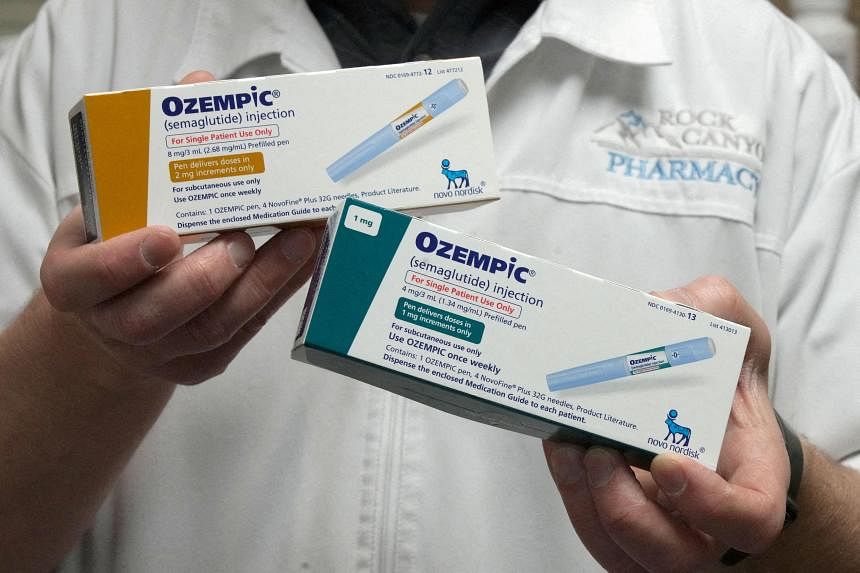LONDON – Britain is reviewing a class of drugs used in a diabetes medicine and a weight-loss treatment sold by Novo Nordisk after some patients reported suicidal or self-harming thoughts, two weeks after similar action by the European Union.
The Medicines and Healthcare products Regulatory Agency (MHRA) said in a statement late on Tuesday it was reviewing safety data on a class of drugs known as GLP-1 receptor agonists.
This includes Novo’s Ozempic, which contains the active ingredient semaglutide, and is approved to treat Type 2 diabetes.
Another drug being reviewed is Novo’s Saxenda, which contains the active ingredient liraglutide and is approved as a weight-loss treatment. Saxenda is Novo’s older GLP-1 drug and has lower effectiveness than its newer obesity treatment Wegovy, which contains semaglutide.
In response to queries from The Straits Times, Singapore’s Health Sciences Authority (HSA) said it has not received any local reports of adverse events of suicidal thoughts or stomach paralysis associated with GLP-1 receptor agonist medicines.
Such medicines, including Ozempic, Rybelsus, Wegovy and Saxenda, can be obtained only from a doctor, or from a pharmacist via prescription from a doctor in Singapore.
“It has not been confirmed whether these reports are linked to the medicines or to the patients’ underlying conditions or other factors,” said an HSA spokesman, adding that the agency is evaluating the safety concerns and monitoring the situation.
“However, patients should take note of potential mental changes while taking these medicines and notify their doctors if they experience any sudden changes in mood, behaviours, thoughts or feelings.”
Novo said it had received a request on Monday from the MHRA about the agency’s review of potential suicidal and self-harming thoughts related to the use of GLP-1 drugs.
“The review is ongoing and a response will be provided within the requested timelines,” it said in a statement.
The MHRA said AstraZeneca’s GLP-1 drug for Type 2 diabetes, called exenatide and marketed as Bydureon, was also included in the review. AstraZeneca did not immediately respond to a request for comment on Wednesday.
The MHRA said two other GLP-1 drugs, Sanofi’s lixisenatide and Eli Lilly’s dulaglutide, were also included.
Sanofi said it is aware that the MHRA is conducting the review.
“We are working with the MHRA,” it said. “Sanofi confirms our continuous patient safety and pharmacovigilance monitoring system has not identified any safety concerns.”
“We are aware of the MHRA’s review,” Eli Lilly said in a statement. “Patient safety is Lilly’s top priority, and we will respond to the review regarding safety signals related to dulaglutide (Trulicity) as part of our routine regulatory review processes.”
GLP-1 receptor agonists were originally developed to treat Type 2 diabetes. They mimic a gut hormone that suppresses appetite, promoting a feeling of fullness.
The MHRA said that its review was initiated on July 12. The agency said it could not specify when it would conclude or what the results might be.
It said the review would consider safety data including adverse drug reactions reported by patients and clinicians to the MHRA and other medicine regulators that it did not name.
Between 2020 and July 6, 2023, the MHRA received five reports of suspected adverse drug reactions involving semaglutide associated with “suicidal and self-injurious behaviour”, via its Yellow Card scheme for collecting and monitoring safety concerns such as side effects from medicine.
Between 2010 and July 6, 2023, the MHRA received 12 reports of suspected adverse drug reactions involving liraglutide also associated with “suicidal and self-injurious behaviour”.
“Patient safety is our top priority,” said Dr Alison Cave, the agency’s chief safety officer.
“We will carefully consider all available evidence and communicate any further advice to patients and healthcare professionals as appropriate.”
The existence of a report is not proof of causation, the MHRA says.
The agency approved Novo’s Wegovy in 2021 for weight-loss treatment, but the drug has not yet been launched in Britain.
Novo has put off introducing the drug in much of Europe to prioritise supplying the United States, where demand has surged since its launch in 2021.
The weekly injection leads to an average weight loss of around 15 per cent, alongside changes to diet and exercise.
The MHRA said in its statement that though Ozempic was not approved for weight loss, “it is commonly used off-label for that purpose” in Britain.
The European Medicines Agency said earlier in July it had begun investigating GLP-1 drugs after Iceland’s health regulator flagged three cases of patients thinking about suicide or self-harm.
It is also investigating GLP-1 drugs for possible risk of thyroid cancer. REUTERS

